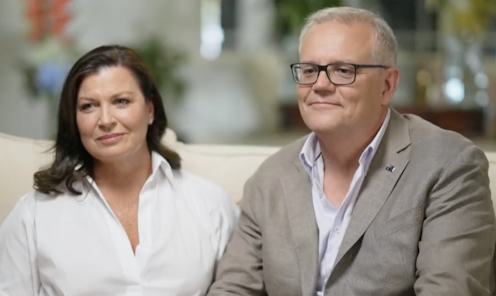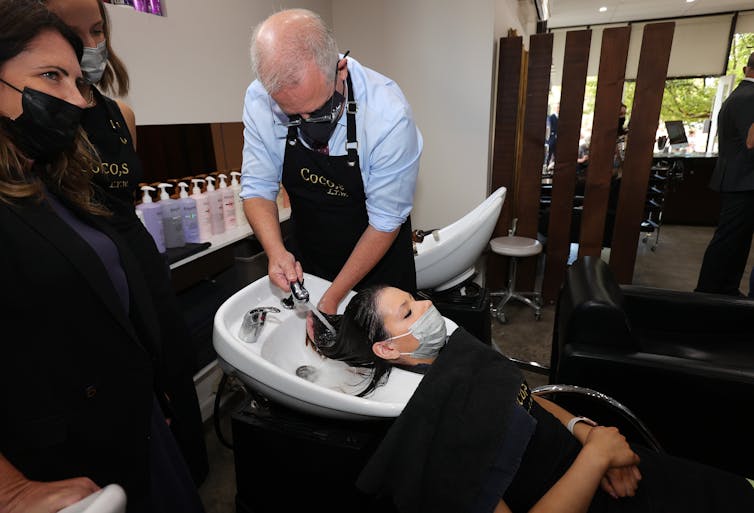
Channel Nine’s 60 Minutes segment about the prime minister and his family, broadcast on February 13, was political confectionery so laden with sugar as to be a serious hazard to Scott Morrison’s political health.
It also raised questions about Nine’s commitment to impartial election coverage.
This is a live issue, given that the company is chaired by Peter Costello, the long-serving treasurer in John Howard’s Liberal-National Coalition government.
Nine is promising an equivalent program on the leader of the opposition, Anthony Albanese. It will be interesting to see whether it turns out to be just more confectionery or whether it will contain some political fibre.
One problem is, if it wishes to be seen as even-handed, 60 Minutes will have to dish up the same schmaltzy fare on him too.
Another problem runs deeper.
The Morrison program was framed not around the prime minister but around his wife Jenny, described in the trailer and in the program itself as the prime minister’s “secret weapon” for the election.
This played into Morrison’s hands. He has already fashioned her into a political asset by repeatedly referring to her in press conferences as someone to whom he turns for advice.
The most notorious example was when he sought her counsel about how to deal with the Brittany Higgins rape allegations and she advised him to think about it as the father of two daughters.
Jenny is thus much more, in political terms, than the prime minister’s wife: her persona has become a central part of his political strategy, and the “secret weapon” description reinforces the point. Bizarre, though. She is neither a secret nor a weapon. She has been well tested as a cast member in Morrison’s political theatre.
How 60 Minutes provides a counterpoint to this in the promised Albanese program we will have to wait and see, but it presents Nine with an awkward challenge if it wants to be seen as genuinely even-handed. Will it find some way to promote a central feature of his election campaign strategy too?
The Morrison program was such a naked piece of political marketing that it also raises questions about what demands were made by the prime minister, and what undertakings were given by Nine about how it would be done.
For instance, why was Karl Stefanovic the interviewer and not one of Nine’s serious political journalists, such as Chris Uhlmann?
Why was there no follow-up questioning of Jenny Morrison on the issue of manners?
The need was obvious.
She was free enough with her criticism of the former Australian of the Year Grace Tame for failing to smile for the cameras with Morrison on Australia Day. Bad manners, apparently.
What about Morrison turning his back on Tanya Plibersek in the House of Representatives while she was speaking at the Despatch Box, or grabbing the hands of unwilling Black Summer bushfire survivors when they point-blank refused to shake his hand?
The soft questions to Morrison were cringe-making. “Do you feel our pain?” asked Stefanovic. In answer, Morrison channelled Shylock in the Merchant of Venice: “I bleed”.
Stefanovic gave Jenny a gratuitous boost by telling her what a straight shooter she was.
And indeed she did come across as a thoroughly decent person, giving a mixture of straight and carefully parsed answers, including a convincing apology for the notorious Hawaiian holiday.
Speaking of which, given this damaging history, it seemed odd of the prime minister to choose to play the ukulele.
Read more: As COVID rips through Australia, is Scott Morrison's media strategy starting to fail as well?
The risk to Morrison’s political health lies in the heavy public-relations packaging of the program.
A stereotype of him as little more than a PR song-and-dance man has already taken hold, as was seen in the blow-back to his recent foray into hairdressing. He was mocked – on Rupert Murdoch’s news.com, no less – as someone who didn’t hold a hose, the clear inference being that he could evidently hold a salon’s shower attachment.

From the point of view of political strategy, more PR is not what Morrison needs. He needs to look prime ministerial.
60 Minutes gave us only a fleeting glimpse of him in this role, welcoming Stefanovic into his office. But even then it consisted mainly of Stefanovic giving him yet another free kick: “You’re under the pump right now.”
This kind of pap is not what voters want or need as they approach the election, something that was obvious from the program’s dismal ratings.
The preceding program was Married at First Sight, which attracted 961,000 viewers, giving 60 Minutes a strong springboard. However, when it came on, viewer numbers plummeted to 574,000, less than the ABC’s imported whodunnit Vera, and on par with the ABC’s Muster Dogs.
Denis Muller does not work for, consult, own shares in or receive funding from any company or organisation that would benefit from this article, and has disclosed no relevant affiliations beyond their academic appointment.
This article was originally published on The Conversation. Read the original article.







